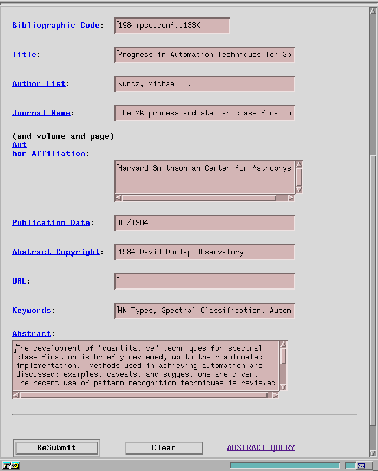 |
Next: Astrobrowse: A Multi-site, Multi-wavelength Service for Locating
Astronomical Resources on the Web
Up: Astrostatistics and Databases
Previous: Literature and Catalogs in Electronic Form:
Questions, Ideas and an Example: the IBVS
Table of Contents -- Index -- PS reprint -- PDF reprint
Michael J. Kurtz, Guenther Eichhorn, Alberto Accomazzi, Carolyn Grant
and Stephen S. Murray
Smithsonian Astrophysical Observatory,
Cambridge, MA 02138, Email: dmink@cfa.harvard.edu
Astronomers can use the ADS to maintain their publication lists; a simple http link can bring a current bibliography at any time. In this paper we show how to form the link, how to include papers which ADS does not currently have, and how to deal with name changes.
The ADS can be reached at: http://adswww.harvard.edu/.
The NASA ADS Abstract Service (Kurtz et al. 1993) is now a standard research tool for the majority of astronomers; more than 10,000 different astronomers use it each month, more than 300,000 queries are made, and more than 30,000 papers are read.
Most astronomers maintain an active list of their publications. Because ADS automatically (from the point of view of a user) obtains nearly all journal articles in astronomy, and many book and conference proceeding articles, it can automatically maintain publication lists for most astronomers.
Linking to a personal bibliography is very simple. For example the following links to Martha Hazen's bibliography.
http://adsabs.harvard.edu/cgi-bin/abs_connect?author=hazen,m.
&aut_syn=YES&nr_to_return=all
This sets the author=last, first initial (author), turns on author synonym replacement (aut_syn), and returns all papers in the database (nr_to_return).
Should last name and first initial not be unique, or if other features are desired the query becomes somewhat more complex. If you want to specify the author middle initial in addition to the first initial, use exact author matching (&aut_xct=YES):
http://adsabs.harvard.edu/cgi-bin/abs_connect?author=last,+f.m.
&aut_xct=YES&return_req=no_params&jou_pick=NO
Note that there can not be any spaces in the URL, so the "+" sign replaces spaces. Also, you can search for two different formats of author names by entering two author arguments, separated with a semicolon. This does not include the listing of parameters at the bottom of the page (return_req=no_params). Also it only returns articles from refereed journals (jou_pick=NO).
While ADS is reasonably complete for astronomy journal articles, it is missing many articles. To have a complete bibliography via ADS one needs but to add the missing articles into ADS. The following link gets the form interface for doing this:
http://adsabs.harvard.edu/submit_abstract.html
Figure 1 shows a completed form.
Note that, while abstracts are most welcome, they are not required for inclusion in the database. If one already has a bibliography, one may reformat it into the simple form shown in:
http://adsabs.harvard.edu/abs_doc/abstract_format.html
then submit the whole list (minus the papers already in ADS) via e-mail to ads@cfa.harvard.edu.
Many people change their names during the course of their careers. In the example above Martha Hazen was M. Hazen, M. Liller, M. Hazen-Liller, and M. Hazen. ADS tracks these changes. If your name is not properly tracked by ADS, just send e-mail to ads@cfa.harvard.edu and list all the names you have published under. Your bibliography will then work properly, so long as the aut_syn flag is set as YES.
Kurtz, M.J., Karakashian, T., Grant, C.S., Eichhorn, G., Murray, S.S., Watson, J.M., Ossorio, P.G., & Stoner, J.L. 1993, in Astronomical Data Analysis Software and Systems II, ASP Conf. Ser., Vol. 52, eds. R.J. Hanisch, R.J.V. Brissenden, & J. Barnes (San Francisco, ASP), 121
Next: Astrobrowse: A Multi-site, Multi-wavelength Service for Locating
Astronomical Resources on the Web
Up: Astrostatistics and Databases
Previous: Literature and Catalogs in Electronic Form:
Questions, Ideas and an Example: the IBVS
Table of Contents -- Index -- PS reprint -- PDF reprint